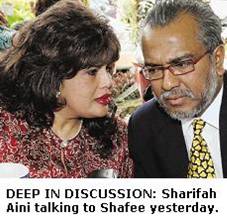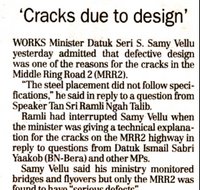 By A. ASOHAN
By A. ASOHAN
January 20, 2007
Defamation suit to test the limits of freedom of speech in cyberspace
IT HAS been threatening to happen for some time now and few who follow developments in the online world were caught by surprise.
When the New Straits Times Press (M) Bhd (NSTP) filed a defamation suit against Malaysian bloggers Ahirudin Attan and Ooi Chuan Aun (a.k.a. Jeff Ooi), the company must have geared up for a severe PR backlash.
The suits were filed by NSTP and its deputy chairman Datuk Kalimullah Hassan, Group Editor-in-Chief Datuk Hishamuddin Aun and former Group Editor Brendan Pereira. NSTP chief executive officer Datuk Syed Faisal Syed A.R. Albar was an additional plaintiff in the suit against Ahirudin.
Ahirudin and Ooi, whose cases will be heard Jan 25 and Jan 30 respectively, must have suspected that something like this was bound to happen sooner or later, and could only hope that they wouldn't be the test cases.
For a few years now, there has been a growing awareness among a cross-section of the local blogosphere that they weren't operating in a legal vacuum, that what they posted on their weblogs or blogs were answerable to the country's laws.
In fact, since last February Ooi had begun carrying a warning on his Screenshots blog (www.jeffooi.com) advising those who posted comments to "bear in mind that whatever is illegal offline is illegal online in this country".
But NSTP would have also known that because it is a major media organisation taking action against two individuals, it would be cast as a David versus Goliath clash. It is going to be an emotionally-charged issue no matter the merits of the case.
One only has to see the reaction of the online community to get an idea. Bloggers are uniting in the face of what they see as intimidation by the powers that be. In various degrees, they see it as a case of mainstream versus alternative media, megacorp versus small fry, old world versus new, controlled versus independent media, repression versus freedom.
Just wait for international media watchdogs and advocates to jump on the bandwagon, too.
Even the foreign wire agencies are painting it in these colours, prominently quoting Opposition Leader Lim Kit Siang's view that the case would have a "chilling effect" on freedom of speech in Malaysia, and that it was a "grave development in the defence of the legal rights of bloggers and citizen journalists in Malaysia to break the stifling monopoly of the mainstream media".
But since when has filing a suit become synonymous with infringing upon one's legal rights? Indeed, wouldn't denying due process to NSTP be an infringement of the plaintiff's rights?
Just as much as bloggers have a right to free and fair comment, those under their scrutiny have a right to legal recourse if they feel they're been portrayed unfairly.
We aren't a failed state yet, the last time I checked.
True, an area of concern would be the ability of Ahirudin and Ooi to mount an effective defence against a relatively deep-pocketed plaintiff, but already supporters of the two bloggers are discussing setting up legal funds for them. Their readers have also noted that some law firms would be happy to defend them on a pro-bono basis.
In a heart-warming way, this is the online community at its best. A movement, Bloggers United, has been formed and has issued a statement that "what you do to any of us, is what you do to all".
The statement added that "as responsible bloggers, we demand and claim our space on the blogosphere for free and fair comment, where important national issues and prominent personalities are discussed."
While there may be extenuating circumstances, which those of us on the outside cannot claim to be privy to, as to why these two bloggers were chosen, a defamation lawsuit involves a third party, in this case the country's legal system, determining if those comments were free and fair.
It also puts the onus on the plaintiff to prove that he suffered "damage" – of reputation, for example – as a result.
The thing is, laws are put in place to protect both individuals and organisations. While they may express their support for the bloggers concerned, surfers should also welcome these lawsuits.
For now lines will be drawn as to what is permissible and what is not in cyberspace; how far you can go in expressing yourself, and more importantly, what legal recourse you have if someone – anyone, including a rival blogger – maligns you on the Net.
Yes, the laws on defamation are there to also protect you, the individual. Given that some political leaders want to introduce new laws specifically for the Internet, that websites and their operators have been threatened with the Internal Security Act, that subtle intimidation has allegedly been tried, and that some media organisations have used their own platforms to unfairly vilify selected bloggers before, it's a welcome change to see existing legislature being used this time around.
Because now, we finally get a case that will also determine just how relevant our laws are in the information age.



